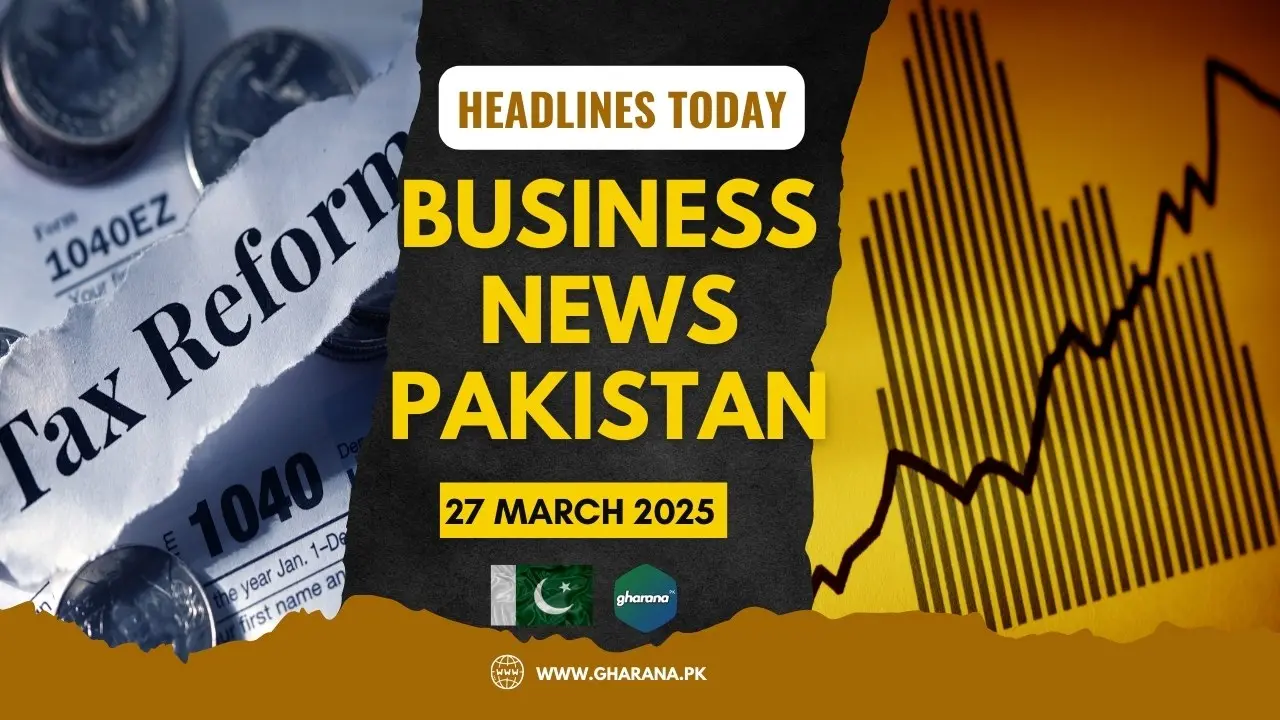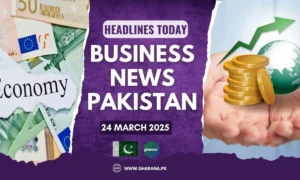Economic shifts, policy developments, and international collaborations marked the business landscape of Pakistan today. From investments in infrastructure to changes in tax policies, Here’s a detailed overview of the Top Business News Headlines Today in Pakistan | 27 March 2025.
Top Business News Headlines Today in Pakistan | 27 March 2025
- Economic Growth Stagnates at 1.7%
- Government Raises Rs1.67 Trillion via Treasury Bills
- Direct Tax Collection Rises 29.4% Year-on-Year
- Denmark Pledges $2 Billion for Pakistan’s Port Development
- Finance Ministry Advocates for Inclusive Globalization
- Sesame Seed Exports to China Soar by 180%
- Extension in Gas Supply for Urea Sector
- Telecom Industry Seeks Tax Relief
- Electricity Tariff Reduction Offers Relief to Consumers
See also: You may read the Our Previous Articles As a Reference from Here
Economic Growth Stagnates at 1.7%
The Bigger Picture
Pakistan’s economic growth rate remains stagnant at 1.7%, highlighting the country’s struggle to overcome structural challenges. This stagnation is attributed to high inflation, currency depreciation, and limited foreign investments. The growth rate underscores the pressing need for robust reforms to stimulate the economy and create a conducive environment for businesses.
Impact on the Economy
Stagnant growth poses risks to employment and income levels, with broader implications for poverty reduction. To reverse this trend, the government must focus on export diversification, enhancing local manufacturing, and improving trade competitiveness.
Government Raises Rs1.67 Trillion via Treasury Bills
Key Developments
In a bid to manage its financial requirements, the government successfully raised Rs1.67 trillion through treasury bills. This borrowing reflects a reliance on domestic resources to cover fiscal deficits.
Why It Matters
While the move ensures short-term liquidity, it highlights the need for structural reforms to reduce reliance on borrowing. Economic analysts suggest that consistent borrowing at this scale could increase inflationary pressures and reduce fiscal space for development spending.
Direct Tax Collection Rises 29.4% Year-on-Year
The Numbers Behind the News
Direct tax collection recorded a significant 29.4% year-on-year increase in the first half of FY25, reaching new highs. This growth reflects improved tax compliance and a broader base, contributing to the government’s revenue generation efforts.
Implications for Fiscal Stability
This surge in direct taxes plays a crucial role in narrowing fiscal deficits and reducing dependence on external debt. It also enables the government to allocate resources toward critical sectors like health, education, and infrastructure.
Denmark Pledges $2 Billion for Pakistan’s Port Development
A Boost for Infrastructure
Denmark has committed $2 billion to enhance Pakistan’s port infrastructure, a development expected to modernize facilities and increase trade efficiency. The maritime minister emphasized that this investment would strengthen Pakistan’s position as a key regional trade hub.
Economic Benefits
This collaboration is likely to generate employment opportunities, improve logistical capabilities, and attract additional foreign investments. It aligns with Pakistan’s vision of boosting exports and improving regional trade connectivity.
Finance Ministry Advocates for Inclusive Globalization
Advocacy for Fair Trade
The Finance Ministry stressed the importance of inclusive globalization, urging developed nations to ensure equitable participation for developing countries in the global economy.
Strategic Implications
This advocacy aligns with Pakistan’s goals of reducing trade barriers and enhancing access to international markets. A fairer global trade framework could provide significant opportunities for Pakistani businesses, especially in textiles and agriculture.
Sesame Seed Exports to China Soar by 180%
The Growth Story
Pakistan’s sesame seed exports to China witnessed a remarkable 180% surge, reflecting growing demand and improved bilateral trade relations. This growth highlights the potential of agricultural exports in boosting foreign exchange earnings.
What Lies Ahead
Strengthening trade partnerships with China and diversifying agricultural exports could further enhance Pakistan’s trade portfolio. This achievement underscores the need for consistent policies to support the agricultural sector.
Extension in Gas Supply for Urea Sector
Decision Details
The government has decided to extend gas supply to the urea sector for an additional three months, ensuring uninterrupted fertilizer production.
Sectoral Impact
This move is expected to stabilize fertilizer prices and support the agricultural sector during the upcoming cropping season. However, concerns remain about the sustainability of gas supply in the face of growing demand.
Telecom Industry Seeks Tax Relief
Industry Challenges
The telecom sector has urged the government to provide tax relief to support its growth and address operational challenges. High taxation has been a significant hurdle for the industry, impacting affordability and service quality.
Potential Benefits of Relief
Tax breaks could encourage investment in digital infrastructure and improve access to affordable services. As Pakistan moves toward a digital economy, such measures are critical for achieving broader connectivity goals.
Electricity Tariff Reduction Offers Relief to Consumers
Good News for Households
Electricity consumers are set to benefit from a 30 paisa reduction in tariffs, providing some relief amid rising inflation.
Economic Context
This tariff cut reflects the government’s commitment to easing the financial burden on households. While the reduction is small, it marks a positive step toward addressing public concerns about energy costs.
The information provided in this article is based on public sources and is intended for informational purposes. Readers are encouraged to verify details independently for accuracy and relevance.
Sources and Citations of News Headlines Today in Pakistan | 27 March 2025
- Economic Growth Stagnates at 1.7%
- Government Raises Rs1.67 Trillion via T-Bills
- Direct Tax Collection Rises by 29.4% YoY
- Denmark’s $2 Billion Investment in Port Sector
- Finance Ministry Advocates for Inclusive Globalization
- Sesame Seed Exports Surge by 180%
- Extension in Gas Supply for Urea Sector
- Telecom Industry Seeks Tax Break
- Electricity Tariff Reduction
**For the latest tech news and reviews, follow Us on our Social handle Google News Twitter, Facebook, and YouTube channel
Frequently Asked Questions (FAQs) News Headlines Today in Pakistan | 27 March 2025
The economic growth rate of Pakistan currently stands at 1.7%. This stagnation is due to high inflation, limited foreign investments, and economic challenges affecting multiple sectors. The government is focusing on policy reforms to revitalize the economy.
The government raised Rs1.67 trillion via treasury bills to manage fiscal deficits and meet financial needs. This borrowing highlights the country’s reliance on domestic resources to address budgetary challenges.
Direct tax collection in Pakistan grew by 29.4% year-on-year during the first half of FY25. This growth reflects better tax compliance and a broader tax base, contributing to government revenue.
Denmark’s commitment of $2 billion to Pakistan’s port infrastructure is expected to modernize trade facilities, improve operational efficiency, and strengthen the country’s position as a key regional trade hub.
Sesame seed exports to China surged by 180% due to higher demand and improved trade relations. This growth showcases the potential of agricultural exports in boosting Pakistan’s foreign exchange earnings.
The extension of gas supply to the urea sector for three months ensures uninterrupted fertilizer production, supporting the agricultural industry and stabilizing fertilizer prices.
The government announced a 30 paisa per unit reduction in electricity tariffs. This move aims to provide relief to households and reduce the financial burden of energy costs amid rising inflation.
The telecom industry is seeking tax relief to overcome operational challenges and promote growth. Lower taxes could improve affordability and the quality of digital services in Pakistan.
The Finance Ministry stressed the need for inclusive globalization, urging developed countries to ensure fair trade opportunities for developing economies like Pakistan. This advocacy promotes equitable economic growth.
The Economic Coordination Committee (Ecnec) approved 13 major projects worth Rs1.275 trillion, focusing on infrastructure development, energy, and social welfare programs to accelerate national progress.







